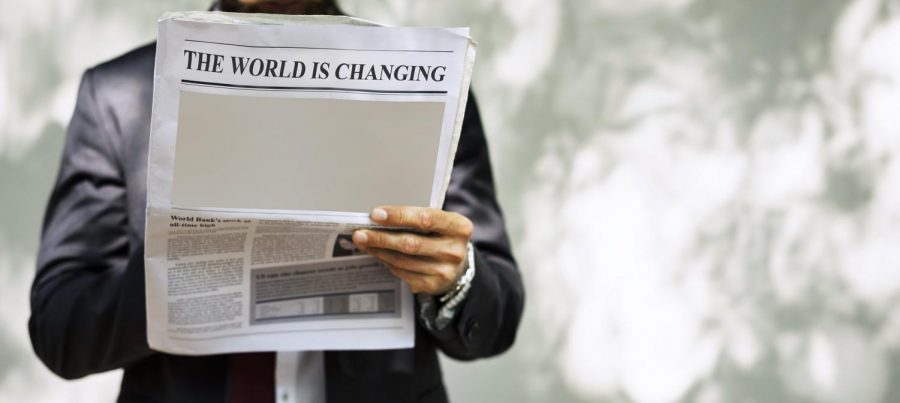Everyone Else Is Hurting, Too: Maintaining Perspective Now is More Important Than Ever Before
Our worlds are changing rapidly every day, and fear is inherent to these distressing times. But it’s important that we also remember how lucky we are to have lives that are only disrupted, and not devastated, by the pandemic. Creative Commons photo: Gerd Altmann on Pixabay.
March 31, 2020
I’ve spent much of this past month lamenting all the things in my life that have been cancelled because of the coronavirus: Menlo Abroad. Summer plans. School. Freedom.
Then I read the headlines. “Coronavirus Could Kill Hundreds of People in LA County.” “Coronavirus Could Spark Another Great Depression.” “Italy’s Coronavirus Surge Strains Hospitals.”
I see my own distress amplified multifold across the nation and across the globe. The headlines keep growing more desperate; the virus is already responsible for over 34,000 deaths worldwide and has infected hundreds of thousands more.
And, meanwhile, I’m concerned about missing my summer camp.
I certainly don’t intend to invalidate anyone’s fear or struggles during this dire era, and I know that the pandemic’s toll on mental health won’t discriminate along the poverty line. Yet, as I wonder what’s going to happen to the millions of people who have lost their minimum-wage jobs, one reality makes itself clear: my own hardships are perhaps the least significant of all.
Hoarding food and other necessities is selfish and unethical because it harms others in our community. But it specifically harms one subset of us — those who already struggle to afford necessities on a daily basis and who now have no chance of securing basics amid rising demand and costs. Food banks are more and more overwhelmed with an abundance of new hungry families to feed and with a shortage of donations and volunteers.
For those like me, who are more fortunate especially in these times, it’s crucial that we keep in mind the rest of our community — like the hundreds of thousands of people in California who are experiencing homelessness and physically cannot shelter-in-place or social distance themselves from others. Among this population that lacks access to housing and health care, the virus will spread like wildfire, and the results will be deadly.
In prisons and jails, authorities are rushing to release vulnerable inmates, but this attempt is too little and too late. Inmates and employees exposed to an infected person are very likely to contract the virus; correctional facilities are like petri dishes for the illness.
Hospitals are already struggling to stay afloat. Some are now painfully turning away patients, and doctors and nurses are overworked to their breaking points. Medical supplies are running dangerously low, forcing some hospitals to either close down or risk the health of their employees.
Widespread crises like the one we face now make us feel vulnerable and powerless. What impact can my contribution possibly make on this pandemic that seems to be consuming the entire world?
Anything helps. And right now, it’s easier to make an immense impact on someone else’s life than it was before the outbreak. Donate to a financial relief fund, and assist those whose livelihoods are broken by job loss. Support medical professionals — today’s war heroes — by donating and providing them with protective gear. Buy gift cards from struggling local companies, and then give them to families in need. Become a leader, and inspire others to help, too. This article by The New York Times, as well as this one by the Washington Post, outline even more ways to give.
Despite our instinct to protect ourselves and our families at all costs, we must give what we can to the millions of people whose losses and circumstances are even worse than our own. The whole globe is suffering, and we — who are mostly young and healthy, who can shelter-in-place inside comfortable homes and continue our education remotely, and who often worry more about falling behind than about daily survival — need to recognize this fact.
If you are in a position that allows you to give, I hope you will consider doing so. Now is a perfect time to work together as a community, and by doing so, we will emerge from this crisis better than we were before.




Mr. Young • Apr 2, 2020 at 6:27 am
Great piece, Emily. Thank you for being such a strong and committed leader to serving the most vulnerable in our local to global community before and during this crisis.
Linda • Apr 1, 2020 at 8:11 pm
Thanks for writing such a positive article during these tough times!
Hopefully this will reach as many people as possible and it will encourage everyone to give and help others.
Ivy Ting • Apr 1, 2020 at 10:14 am
I appreciate the article for giving me the senses of our young generation who has such great vision, kindness and caring for the others.
Great article! Emily